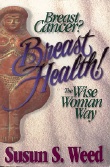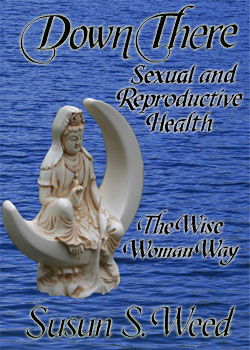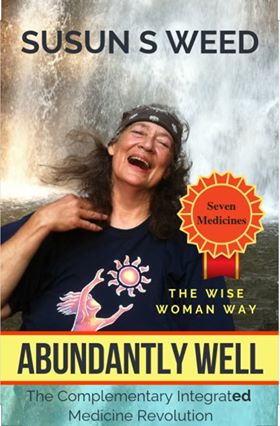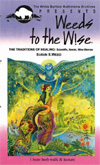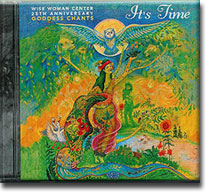Herbal Allies for Pregnancy Problems
By Susun Weed
Wise women believe that most of the problems of pregnancy can be prevented by attention to nutrition. Morning sickness and mood swings are connected to low blood sugar; backaches and severe labor pains often result from insufficient calcium; varicose veins, hemorrhoids, constipation, skin discoloration and anemia are evidence of lack of specific nutrients; preeclampsia, the most severe problem of pregnancy, is a form of acute malnutrition. Excellent nutrition includes pure water, controlled breath, abundant light, loving and respectful relationships, beauty and harmony in daily life, joyous thoughts and vital foodstuffs.
During pregnancy nutrients are required to create the cells needed to form two extra pounds of uterine muscle, the nerves, bones, organs, muscles, glands and skin of the fetus, several pounds of amniotic fluid, a placenta and a 50 percent increase in blood volume. In addition, extra kidney and liver cells are needed to process the waste of' two beings instead of one.
Wild foods and organically grown produce, grains and herbs are the best source of vitamins, minerals and other nutrients needed during pregnancy. All the better if the expectant mother can get out and gather her own herbs: stretching, bending, breathing, moving, touching the earth, taking time to talk with the plants and to open herself to their spiritual world.
TONICS DURING PREGNANCYWise women have recommended herbal tonics for childbearing for thousands of years. These herbs are empirically safe and notably effective. Tonic herbs improve general health by balancing and sustaining energy flow and focus in the body.
Tonics allay annoyances and prevent major problems. They can boost the supply of vital minerals and vitamins, increase energy and improve uterine tone. Some uterine tonics are contraindicated during pregnancy or are restricted to the last few weeks of pregnancy.
The tonics indicated for pregnancy need to be used regularly; a tonic is to the cells much as exercise is to the muscles: not much use when done erratically. Of course even occasional use of tonics during pregnancy will be of benefit, since they do contain nourishing factors. Better benefit will come from using them 5 times a week or more.
Some simple suggestions to get into the habit of' using tonics: pregnant women could replace the morning cup of coffee with a rich Nettle infusion. Or she could brew up some raspberry leaf tea and put it in the refrigerator to drink instead of soda, wine, or beer. Wild greens can be added to the diet. Women in many cultures have used the following herbs for centuries to have a healthier pregnancy.
RED RASPBERRY LEAVES (Rubus spp.)Brewed as a tea or as an infusion, raspberry is the best known, most widely used, and safest of all uterine and pregnancy tonic herbs. It contains fragrine, an alkaloid which gives tone to the muscles of the pelvic region, including the uterus itself.
Most of the benefits ascribed to regular use of Raspberry tea through pregnancy are traced to the nourishing source of vitamins and minerals found in this plant and to the strengthening power of fragrine - an alkaloid which gives tone to the muscles of the pelvic region, including the uterus itself. Of special note are the rich concentration of vitamin C, the presence of vitamin E and the easily assimilated calcium and iron. Raspberry leaves also contain vitamins A and B complex and many minerals, including phosphorous and potassium.
The benefits of drinking a raspberry leaf brew before and throughout pregnancy include:
~ Increasing fertility in both men and women. Raspberry leaf is an excellent fertility herb when combined with Red Clover.
~ Preventing miscarriage and hemorrhage. Raspberry leaf tones the uterus and helps prevent miscarriage and postpartum hemorrhage from a relaxed or atonic uterus.
~ Easing of morning sickness. Many attest to raspberry leaves' gentle relief of nausea and stomach distress throughout pregnancy.
~ Reducing pain during labor and after birth. By toning the muscles used during labor and delivery, Raspberry leaf eliminates many of the reasons for a painful delivery and prolonged recovery. It does not, however, counter the pain of pelvic dilation.
~ Assisting in the production of plentiful breast milk. The high mineral content of Raspberry leaf assist in milk production, but its astringency may counter that for some women.
~ Providing a safe and speedy pariuntion. Raspberry leaf works to encourage the uterus to let go and function without tension. It does not strengthen contractions, but does allow the contracting uterus to work more effectively and so may make the birth easier and faster.
NETTLE LEAVES (Urtica Dioca)Less well known as a pregnancy tonic but deserving a kinder reputation and use, Urtica is one of the finest nourishing tonics known. It is reputed to have more chlorophyll than any other herb. The list of vitamins and minerals in this herb includes nearly every one known to necessary for human health and growth.
Vitamins A, C, D and K, calcium, potassium, phosphorous, iron and sulphur are particularly abundant in nettles. The infusion is a dark green color approaching black. The taste is deep and rich. If you are blessed with a nettle patch near you, use the fresh plant as a pot herb in the spring.
Some pregnant women alternate weeks of nettle and raspberry brews; others drink raspberry until the last month and then switch to nettles to insure large amounts of vitamin K in the blood before birth.
The benefits of drinking nettle infusion before and throughout pregnancy include:
~ Aiding the kidneys. Nettle infusions were instrumental in rebuilding the kidneys of a woman who was told she would have to be put on a dialysis machine. Since the kidneys must cleanse 150 percent of the normal blood supply for most of the pregnancy, nettle's ability to nourish and strengthen them is of major importance. Any accumulation of minerals in the kidneys, such as gravel or stones, is gently loosened, dissolved and eliminated by the consistent use of nettle infusions.
~ Increasing fertility in women and men.
~ Nourishing mother and fetus.
~ Easing leg cramps and other spasms.
~ Diminishing pain during and after birth. The high calcium content, which is readily assimilated, helps diminish muscle pains in the uterus, in the legs and elsewhere.
~ Preventing hemorrhage after birth. Nettle is a superb source of vitamin K, and increases available hemoglobin, both of which decrease the likelihood of postpartum hemorrhage. Fresh Nettle Juice, in teaspoon doses, slows postpartum bleeding.
~ Reducing hemorrhoids. Nettle's mild astringency and general nourishing action tightens and strengthens blood vessels, helps maintain arterial elasticity and improves venous resilience.
~ Increasing the richness and amount of breast milk.
CALCIUMOf course calcium is a mineral, not an herbal tonic, but it is so important during pregnancy and throughout our woman lives that I consider it a tonic. Lack of adequate calcium during pregnancy is associated with muscle cramps, backache, high blood pressure, intense labor and afterbirth pains, osteoporosis, tooth problems, and preeclampsia.
Calcium assimilation is governed by exercise, stress, acidity during digestion, availability of' Vitamin C, A and especially D, and availability of magnesium and phosphorous in the body and the diet. Getting 1000 to 2000 mg of calcium every day is not hard with the help of Wise Woman herbs:~ The best food sources of calcium are fish dairy products, but there is controversy about the assimilability of calcium from pasteurized, homogenized milk. My preferred food sources include goat milk and goat cheese, salmon, sardines, mackerel, seaweed (especially kelp), sesame salt (gomasio), tahini and dark leafy greens Such as turnip tops, beet greens and kale.
~ There are roughly 200 mg of calcium in two ounces of nuts (excluding peanuts), one ounce of dried seaweed, two ounces of carob powder, one ounce of cheese, half a cup of cooked greens, (kale, collards and especially dandelion) half a cup of milk, three eggs, four ounces of fish, or one tablespoon of molasses.
~ Most wild greens are exceptionally rich in calcium arid the factors need for calcium absorption and use. lambs quarters, mallow, galinsoga, shepherd's purse, knotweed, bidens, amaranth and dandelion leaves all supply more calcium per 100 grams than does milk.
~ Bones soaked in apple cider vinegar release their calcium into the acidic vinegar. A tablespoon of this vinegar in a glass of water supplies needed calcium and relieves morning sickness too.
~ Many fruits are rich in calcium (though not as rich as the above foods). Dried dates, figs raisins, prunes, papaya and elderberries are the best source.
~ Raspberry leaf infusion contains calcium in its most assimilable form. Assimilation is further enhanced by the presence of phosphorous and vitamins A and C in the raspberry leaves.
~ Fresh parsley and watercress are available in most grocery stores year round. They are both good sources of many minerals and vitamins, including calcium, phosphorous, vitamin A and vitamin C.
~ Nettle Infusion supplies calcium and phosphorous, vitamin A and the vital vitamin D, in a readily assimilable form.
~ Foods that are thought to interfere with absorption of calcium should be avoided: spinach, chocolate, rhubarb and brewer's yeast.
~ Do not use bone meal or oyster shell tablets as sources of supplemental calcium. They have been found to be high in lead, mercury, cadmium and other toxic metals.
TONICS TO USE WITH CAUTIONSquaw Vine (Mitchella repens), Blue Cohosh (Caulophyflum thalicotroides), and Black Cohosh (Cimicifuga racemosa) all should be avoided until the last 4 to 6 weeks of pregnancy. Even then, they should be used only when indicated, and under the supervision of someone experienced in their use. Some midwives report that the Cohoshes must be used together (not interchangeably). Others have reported premature labor when Blue Cohosh was taken in combination with Pennyroyal. False Unicorn Root (Helonias dioica), Dong Quai (Angelica spp.) and PN6 capsules are considered too strong for use during pregnancy.
I harvest the flowering stalks when they are fully formed; and I am careful to use the cultivated garden comfrey, which grows very tall and has purplish, pinkish, bluish flowers. I avoid wild comfrey which stays rather small, even when flowering, and has cream-colored, white, or yellowish flowers.
Some people feel that comfrey is not safe to use during pregnancy. Some people feel comfrey is not safe to use internally at all. I disagree. The roots of comfrey do contain compounds that are best avoided during pregnancy. (As do all parts of the wild plant.) In fact, I rarely use comfrey root because of the possibility of liver congestion, and I strongly caution those who have had hepatitis, chemotherapy, or alcohol problems to strictly avoid comfrey root. Yet even these people can benefit from use of comfrey leaf infusions.* Another important herbal ally for women over forty who desire a child is chaste tree (Vitex agnus-casti). It has been used in Africa and parts of Europe for several thousand years to discourage the male libido. In women, the effects seem to be the opposite! It may also be a fertility enhancer. Most importantly, chaste tree is a strengthening tonic for the pituitary gland, the master control gland for the endocrine system. Daily use of the tincture of the berries (1 dropperful/1 ml 2-3 times daily) had been shown to increase progesterone--the hormone of pregnancy--and luteinizing hormone--which promotes conception. Because it can lower prolactin levels, chaste tree is best discontinues during the last trimester of pregnancy.
* Dong quai (Angelica sinensis) is not recommended for women over forty. In general, this herb promotes blood flow to the uterus and surrounding tissues. This can promote the growth of fibroids and increase the risk of post-partum hemorrhage. Ginger is a better warming tonic; motherwort is better at relieving pain; and raspberry is better at preparing the uterus for birth.
For permission to reprint this article, contact us at: www.ashtreepublishing.com/contactVisit Susun Weed at: www.susunweed.com and www.wisewomanbookshop.com
Susun Weed’s books include:
Wise Woman Herbal for the Childbearing Year
Author: Susun S. Weed.
Simple, safe remedies for pregnancy, childbirth, lactation, and newborns. Includes herbs for fertility and birth control. Foreword by Jeannine Parvati Baker. 196 pages, index, illustrations.
Order at: www.wisewomanbookshop.com
Healing Wise
Author: Susun S. Weed.
Superb herbal in the feminine-intuitive mode. Complete instructions for using common plants for food, beauty, medicine, and longevity. Introduction by Jean Houston. 312 pages, index, illustrations.
Order at: www.wisewomanbookshop.com

NEW Menopausal Years the Wise Woman Way
Author: Susun S. Weed.
The best book on menopause is now better. Completely revised with 100 new pages. All the remedies women know and trust plus hundreds of new ones. New sections on thyroid health, fibromyalgia, hairy problems, male menopause, and herbs for women taking hormones. Recommended by Susan Love MD and Christiane Northrup MD. Introduction by Juliette de Bairacli Levy. 304 pages, index, illustrations.
Order at: www.wisewomanbookshop.com
For excerpts visit: www.menopause-metamorphosis.com
Breast Cancer? Breast Health!
Author: Susun S. Weed.
Foods, exercises, and attitudes to keep your breasts healthy. Supportive complimentary medicines to ease side-effects of surgery, radiation, chemotherapy, or tamoxifen. Foreword by Christiane Northrup, M.D. 380 pages, index, illustrations.
Order at: www.wisewomanbookshop.com
Down There: Sexual and Reproductive Health the Wise Woman Way
Publication date: June 21, 2011
Author: Susun S. Weed
Simple, successful, strategies cover the entire range of options -- from mainstream to radical -- to help you choose the best, and the safest, ways to optimize sexual and reproductive health. Foreword: Aviva Romm, MD, midwife, 484 pages, Index, illustrations.
Order at: www.wisewomanbookshop.com
Abundantly Well - Seven Medicines The Complementary Integrated Medical Revolution
Publication date: December 2019
Author: Susun S. Weed
Seven Medicines build foundational health and guide you to the best health care when problems arise. Includes case studies, recipes, exentsive references and resources. Introduction by Patch Adams illustrated by Durga Yael Bernhard 352 pages, index, illustrations
Order at: www.wisewomanbookshop.com
Susun Weed's Video & CD's:Weeds to the Wise DVD Video
Visit Susun's farm for a weed walk. Hear her talk on the Three Traditions of Healing. Make infusion with her. Fun! (1 hour VHS video) Please note: this VHS video tape is in NTSC format which may not be compatible with video players outside of the USA and Canada.
Order at: www.wisewomanbookshop.com
Susun Weed's "It's Time"
Wise Woman Center
25th Anniversary Celebration CD
GODDESS CHANTS CD
Visit www.goddesschants.com to hear all the songs, read lyrics &
learn about the artists.
18 Wise Woman Songs & Chants from the heart
Susun Weed's Audio CD Series
~ Elements of Herbalism: Harvesting - 2 CD set
~ Elements of Herbalism: Dosage - 3 CD set
~ My Ally Motherwort - 2 CD set
~ Triple Goddess Herbs - 1 CD
~ The Cervix: Gateway to Life - 1 CD
~ Healthy Bones The Wise Women Way - 2 CD set
~ My Herbal Medicine Chest - 3 CD set
~ Herbal Mouth Care The Wise Women Way - 2 CD set
~ Magical Plants INTENSIVE - 3 CD set
~ Chronic Problems the Wise Woman Way - 2 CD set
For Wholesale orders see our terms letter or contact us at:
Ash Tree Publishing PO Box 64 Woodstock, NY 12498 ~
Website: www.wisewomanbookshop.com ~
Susun Weed, green witch and wise woman, is an extraordinary teacher with a joyous spirit, a powerful presence, and an encyclopedic knowledge of herbs and health. She is the voice of the Wise Woman Way, where common weeds, simple ceremony, and compassionate listening support and nourish health/wholeness/holiness. She has opened hearts to the magic and medicine of the green nations for three decades. Ms. Weed's Six herbal medicine books focus on women's health topics including: menopause, childbearing, and breast health. Visit her site www.susunweed.com for information on her workshops, apprenticeships, correspondence courses and more! Venture into the Menopause site www.menopause-metamorphosis.com to learn all about the Menopausal Years the Wise Woman Way.
Join Susuns Mentorship site for personal one on one mentorship! We also invite you to visit our commerce site www.wisewomanbookshop.com to learn about our Wise Woman publications, workshops, correspondence courses. As well as online courses at Wise Woman School.
back to articles index
back to press kit
© Susun Weed -Wise Woman Center
~ Disclaimer & Privacy Policy ~


